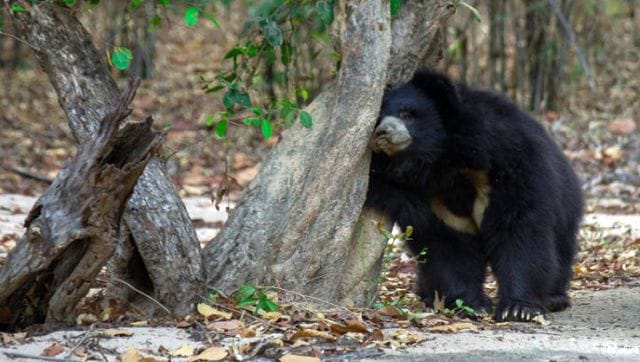UK dog undergoes rehab for alcohol addiction: Can animals turn alcoholics?
UK dog undergoes rehab for alcohol addiction: Can animals turn alcoholics?

We often come across the news of celebrities undergoing rehab for alcohol addiction. However, it’s not every day that we hear or read about a dog detox. But that’s exactly what happened to a Labrador mix in United Kingdom that went through rehab for alcohol addiction.
Two-year-old Coco got addicted to alcohol as his owner had a habit of leaving his drink out before going to sleep. After his owner died, Coco was found by veterinarians with another dog hooked on booze and was taken to Woodside Animal Welfare Trust in Plymouth, western England. Coco was sedated for four weeks to help ease his withdrawal symptoms. He is now off all medication and starting a new life.
The animal welfare group said that it was still unknown how exactly the canine got hooked to alcohol, but if it wasn’t for their help and care, “Coco would likely have not survived this heart breaking ordeal”, they said. The group is now searching for a home for the pooch.
But this begs the larger question? Can animals actually get addicted or even high on alcohol?
Keep that beer can away from your canine
Alcohol consumption for canines is an absolute no. Just like chocolate and onions, alcohol is toxic to dogs. Even small amounts of alcohol — not only in drinks but also in syrups or cake or even household items — can have ingredients that are poisonous for them.
Renee Schmid, a senior veterinary toxicologist at the Pet Poison Helpline explains that while dogs are able to metabolise the ethanol, it wreaks massive havoc inside the canine’s system. She says in a report published by GreatPetCare, “The dose makes the poison. It matters how much they get into, as well as the animal’s size. A Labrador would be able to consume more than a Chihuahua.”
When dogs consume alcohol they suffer from alcohol poisoning which is very similar to when humans suffer the same. “They may appear dazed or sedate and have some difficulty walking,” says Schmid, adding that vomiting is another symptom of alcohol poisoning in canines.

Alcohol can also induce a life-threatening condition known as metabolic acidosis in dogs. This rapid rise in acidity levels has several adverse effects, including respiratory depression, hypothermia, dangerously low heart rate and blood pressure, and heart attacks.
All in all, it means that dogs can’t handle their booze and should steer clear of all spirits.
The alcoholics of the animal world
But what about other animals? While dogs should stay away from alcohol, is it the same for other animals too?
According to experts, there are some animals who have a taste for alcohol.
The pen-tailed tree shrew of Malaysia has the honour for having the world’s highest alcohol tolerance. A mid-1990s study by Frank Wiens and Annette Ziztmann, animal physiologists at Germany’s University of Bayreuth, revealed that this tiny little creature regularly consumes the equivalent of about nine alcoholic beverages a night. But despite the high alcohol levels, they don’t get fuzzy and don’t display any signs of drunken behaviour.

Vervet monkeys on the Caribbean island of St. Kitts are also known for their love of the bottle. It has been reported that these primates roam the beaches waiting for people to leave their drinks so that they can gulp it down. Imagine, an island of drunken monkeys! But what makes them fond of the booze? It is said that the animals lived in an environment dominated by sugar cane plantations. And when the sugar cane was burned, or occasionally fermented before harvest, it became a treat for the monkeys. As they became accustomed to the ethanol in the fermented cane juice, the monkeys may have developed both a taste and tolerance for alcohol.
Also read: Not UK, not France, not Germany, it’s Latvia that tops booze consumption in Europe
A past study has shown that humans’ love for alcohol arose millions of years ago, when our ape and monkey ancestors discovered that the scent of alcohol led them to ripe, fermenting and nutritious fruit.
In India, the sloth bear is known for his love of mahua, which is known for its alcoholic properties. The tree is most commonly found in states of West Bengal, Odisha, Chhattisgarh, Jharkhand, Uttar Pradesh, Bihar, Gujarat, Maharashtra, Madhya Pradesh, Telangana, Kerala, and Tamil Nadu.
Wildlife experts state that it is because of mahua has been a recurrent factor in numerous cases of conflict between man and bear. These shaggy bears are often found foraging under Mahua trees, especially at night. Thus, when villagers venture towards the tree for collection at dawn, they are greeted by a slot bear just awakened from his slumber. There have also been cases of sloth bears entering residences where Mahua liquor is being brewed.

Besides sloth bears, there have also been reports of elephants consuming mahua and getting drunk. As recently as April last year, villagers in Odisha’s Keonjhar district found 24 tuskers apparently drunk, sleeping near the place where mahua flowers were kept in water in large pots for fermentation.
While some experts argue that the pachyderms don’t drink spirits at all, there are studies that show that elephants are lightweights, because they lack a key enzyme that quickly metabolises ethanol.
Also read: Beer for the sole: Someone has actually made a shoe filled with lager
Apart from these animals, bats are also huge consumers of alcohol off fermented fruit. A 2009 study in Belize published by PLOS One, the highest blood alcohol content in bats was 0.3 per cent.
It’s a really sobering thought that animals enjoy or consume alcohol like humans. There’s one thing that is clear — in the animal kingdom, just like in human society, the effects of alcohol are not to everyone’s taste.
With inputs from agencies
Read all the Latest News, Trending News, Cricket News, Bollywood News,
India News and Entertainment News here. Follow us on Facebook, Twitter and Instagram.
What's Your Reaction?



























































